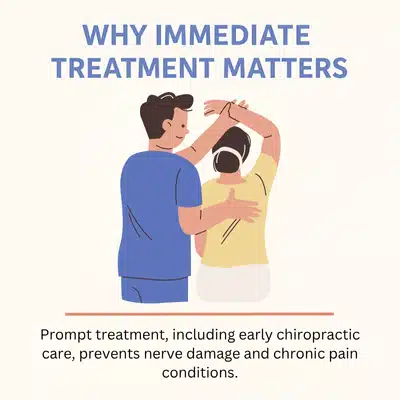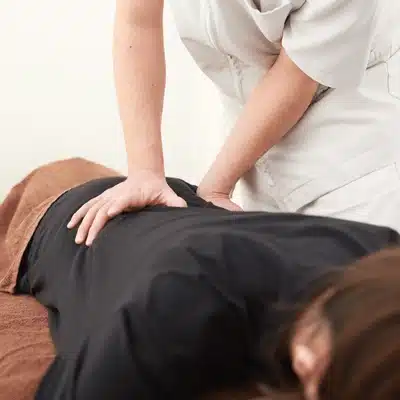Sharp, radiating pain shoots down your arm. Tingling fingers wake you at night. Your leg feels weak and numb. These pinched nerve symptoms can stop your daily life cold.
You’re wondering: can a chiropractor fix a pinched nerve? The answer is yes. Chiropractors specialize in treating pinched nerves by removing pressure from compressed nerves and restoring normal function to your nervous system.
A pinched nerve often develops when swollen discs, tight muscles, or misaligned vertebrae crowd the fragile nerve roots leaving the spine. Skilled chiropractic adjustments gently guide those structures back into place, creating space that lets the pinched nerve heal and circulate vital nutrients again. This hands-on approach is at the heart of modern chiropractic care, and it often begins with a thorough exam, orthopedic tests, and imaging to pinpoint the exact site of irritation. Once the doctor has mapped your unique pain pattern, a custom pinched nerve treatment plan follows, usually a blend of joint mobilization, soft-tissue work, and targeted stretches you can perform at home.
The goal is simple: alleviate pain, correct the cause, and keep the problem from returning. Patients frequently report that consistent chiropractic care helps relieve pain within a few visits while also improving grip strength, balance, and sleep quality. Over time, exercises that stabilize the core and shoulders can prevent the same pinched nerve from flaring up again.
What Is a Pinched Nerve?

A pinched nerve occurs when too much pressure squeezes a nerve from surrounding tissues. These tissues include bones, muscles, tendons, or cartilage. The pressure disrupts nerve function and causes pain, tingling, numbness, or muscle weakness.
Your spinal cord sends nerves throughout your body. When something compresses these nerves, signals cannot travel properly between your brain and affected areas. This creates the uncomfortable symptoms you feel.
In many cases, swollen muscle tissue or a bulging disc crowds the nerve root, setting off the familiar symptoms of a pinched nerve in your neck, back, arm, or leg. Chiropractors begin treating pinched nerves with a thorough exam that identifies the exact site of compression and maps the symptoms of a pinched nerve to surrounding joints.
A personalized treatment plan may include gentle spinal decompression techniques that open the space between vertebrae, allowing the pinched nerve to calm down and heal. Alongside precise adjustments, targeted stretches and posture coaching help alleviate symptoms and prevent relapse.
Chiropractic care often combines manual therapy with ergonomic advice to fix a pinched nerve before it becomes chronic. By monitoring progress and adjusting exercises, your doctor can address lingering symptoms of a pinched condition, fine-tuning each visit until the pinched nerve responds fully. Consistency is key when treating pinched nerves because progressive gains reduce pain, restore strength, and let you return to daily activities sooner.
Common pinched nerve locations include:
- Neck (cervical spine)
- Lower back
- Shoulder
- Wrist (carpal tunnel syndrome)
- Hip
Nerve compression can happen to anyone. Office workers develop neck problems from poor posture. Athletes suffer nerve injuries from repetitive movements. Seniors experience pinched nerves from bone spurs and spinal stenosis.
Pinched Nerve Symptoms to Watch For

Pinched nerve symptoms vary based on which nerve is affected. Common signs include:
Sharp or burning pain that radiates along the nerve path. A compressed nerve in your lower back might send intense pain down your leg. Cervical spine compression can cause pain shooting into your shoulder and arm.
Tingling and numbness create that “pins and needles” feeling. You might notice your fingers or toes “falling asleep” more often. Some people describe this as electric sensations.
Muscle weakness develops because nerves control muscle function. A pinched nerve in your neck might make gripping objects difficult. Lower back nerve compression can cause leg weakness or foot drop.
Muscle spasms often accompany pinched nerve pain. Your body tightens surrounding muscles to protect the affected area, creating additional discomfort.
Symptoms typically worsen at night or after staying in one position too long. You might struggle to find comfortable sleeping positions. Simple activities like turning your head or bending over become painful.
Common Causes of Pinched Nerves
Several factors contribute to compression:
Herniated or bulging discs are leading causes
of a pinched nerve because spinal discs cushion your vertebrae, and when a disc degenerates or herniates, it can press directly on the affected nerve. A pinched nerve occurs when that pressure blocks normal nerve function, often in the lower back, creating intense sciatic pain in the affected area. Chiropractors and physical therapists focus on spinal decompression techniques to alleviate pain and restore mobility, while patients can alternate heat with cold therapy to reduce inflammation and speed recovery from a pinched nerve episode.
Bone spurs develop from arthritis and aging
These bony growths can narrow spaces where nerves travel, compressing roots and causing yet another pinched nerve. The resulting tingling or numbness may radiate into arms or legs, but precise imaging pinpoints the obstruction so conservative care or surgery can clear the pathway.
Poor posture strains your spine over time
Slouching at a desk, forward-head position, and improper lifting create misalignments that gradually lead to a pinched nerve. Ergonomic chairs, core-strengthening routines, and mindful posture breaks support healthy alignment and help alleviate pain before it becomes chronic.
Repetitive movements from work or sports accelerate wear and tear
Assembly-line workers, marathon typists, and tennis players frequently develop a pinched nerve from muscle imbalance and joint stress. Cross-training, stretching, and scheduled rest periods reduce friction on tissues and give irritated nerves space to heal.
Excess weight adds pressure to your spine and supporting structures
This extra load can speed disc degeneration, joint problems, and yet another pinched nerve in weight-bearing segments. Sustainable weight management and low-impact exercise take pressure off joints and keep discs hydrated.
Serious injuries from accidents, falls, or sports can cause immediate compression
Whiplash, sudden disc herniation, or vertebrae misalignment may trigger a pinched nerve, sometimes requiring bracing, manual realignment, or targeted rehabilitation to restore proper stacking of spinal bones.
Risk factors include aging, a family history of spine problems, diabetes, and prolonged bed rest
Multiple risk factors often combine to create nerve compression, leading to another pinched nerve flare. Identifying lifestyle triggers, strengthening core muscles, and scheduling regular spinal check-ups remain essential steps to prevent and manage every future pinched nerve.
Why Immediate Treatment Matters

Don’t ignore persistent nerve pain or the persistent pain that signals a pinched nerve. Prompt treatment, including early chiropractic care, prevents nerve damage and chronic pain conditions. Common risk factors such as poor posture, repetitive motions, and sudden injuries place too much pressure on the surrounding tissues, creating the mechanical stress that produces a pinched nerve.
When patients choose chiropractic care at the first twinge, many patients experience significant relief because precise chiropractic adjustments gently relieve pressure and alleviate pressure on the irritated root, restoring normal nerve function to the affected area.
Prolonged pressure damages nerve structure. Picture squeezing a garden hose: a brief squeeze slows flow, but extended compression can permanently damage the hose. In the spine, a pinched nerve suffers the same fate when adjacent discs, ligaments, or spasming muscles crowd the canal.
Over time the protective myelin frays, and the pinched nerve loses its ability to transmit clear signals. Strategic stretching, ergonomic corrections, and targeted chiropractic adjustments work together to keep motion segments open and alleviate pain before lasting impairment occurs.
UCHealth warns that an untreated pinched nerve can lead to chronic pain and permanent loss of function. Your body gradually adapts to constant compression, so a pinched nerve becomes harder to reverse the longer it remains unchecked.
Consistent chiropractic care maintains joint mobility and gives a pinched nerve the space it needs to heal. Combine rest, gentle exercise, and cold therapy, and patients experience significant relief, reducing the odds that a lingering pinched nerve will become a lifelong burden.
Early intervention offers several benefits:
- Faster symptom relief
- Prevention of permanent nerve damage
- Shorter overall healing process
- Better long-term outcomes
Seek help if you experience =pain, numbness, or weakness lasting more than a few days. Severe pain, sudden muscle weakness, or symptoms following injury require immediate attention.
How Chiropractors Fix Pinched Nerves
Chiropractors address the root cause of compression rather than just masking symptoms. They use proven techniques to relieve pressure on affected nerves.
Comprehensive Evaluation
Treatment begins with thorough assessment. Your chiropractor reviews medical history, examines your spine, and tests nerve function. They check reflexes, muscle strength, and sensation to pinpoint which nerve is compressed.
Range of motion tests reveal restricted movement. Palpation identifies misaligned vertebrae or muscle tension. X-rays or MRI may be needed to see disc problems or bone spurs clearly.
This detailed evaluation determines the exact cause of your compression and guides treatment planning.
Spinal Adjustments
Spinal manipulation is the cornerstone of chiropractic treatment for pinched nerves. Adjustments involve applying controlled force to restore proper joint movement and alignment.
When vertebrae shift out of position, they can narrow spaces where nerves exit the spinal cord. Gentle adjustments realign these bones, opening nerve pathways and reducing compression.
You might hear popping sounds during adjustments – this is normal gas release from joints. Many patients experience immediate pain relief as pressure comes off the compressed nerve.
Research shows spinal adjustments effectively reduce pain and improve function. A study of 162 patients with nerve pain found 85.5% experienced significant relief through chiropractic treatment.
Spinal Decompression Therapy
For herniated discs or spinal stenosis, chiropractors use decompression techniques. These gently stretch the spine to create negative pressure around compressed nerves.
Manual decompression involves specific stretching movements. Computerized decompression tables provide controlled traction cycles. Both methods aim to retract herniated disc material and widen nerve pathways.
Patients often notice reduced pain and tingling after decompression sessions as nerve irritation decreases.
Soft Tissue Therapy
Massage therapy and stretching complement spinal adjustments. Tight muscles and fascia can contribute to nerve compression. Manual therapy relaxes these tissues and improves circulation to promote healing.
Trigger point therapy targets specific muscle knots that may irritate nerves. Therapeutic stretching restores flexibility and reduces tension around the affected area.
Exercise and Rehabilitation
Chiropractors prescribe specific exercises to strengthen supporting muscles and improve posture. Core strengthening protects the lower back. Neck exercises improve spine stability.
Nerve gliding exercises help mobilize trapped nerves and reduce adhesions. These gentle movements restore normal nerve sliding within surrounding tissues.
Proper rehabilitation prevents future pinched nerve episodes by addressing underlying muscle imbalances and movement patterns.
Lifestyle Modifications
Education plays a crucial role in treatment and prevention. Chiropractors provide ergonomic advice for workplace setup, proper lifting techniques, and sleeping positions.
Posture correction helps prevent recurring compression. Weight management reduces spinal stress. Stress reduction techniques address muscle tension that can worsen symptoms.
Benefits of Chiropractic Care

Choosing chiropractic treatment for pinched nerves offers unique advantages:
Addresses Root Causes – Unlike pain relievers that mask symptoms, chiropractic adjustments remove the source of compression. This provides lasting relief rather than temporary fixes.
Drug-Free and Non-Invasive – No medications means no side effects. No surgery means no downtime or complications. Chiropractic works with your body’s natural healing process.
Proven Effectiveness – Clinical guidelines recommend spinal manipulation for neck and back pain with nerve involvement. Studies show high success rates for conservative chiropractic treatment.
Immediate Relief – Many patients feel improvement right after their first adjustment as pressure releases from nerves.
Prevents Surgery – Successful chiropractic care often eliminates the need for invasive procedures. Early conservative treatment helps you avoid more drastic interventions.
Whole-Person Approach – Chiropractors consider your lifestyle, work habits, and overall health. They provide comprehensive care that prevents future problems.
High Patient Satisfaction – People appreciate the hands-on care and time chiropractors spend addressing their concerns.
Traditional Treatments vs. Chiropractic Care
Standard medical approaches for pinched nerves include:
- Rest and activity modification
- Ice and heat therapy
- Pain relievers and anti-inflammatory drugs
- Physical therapy
- Steroid injections
- Surgery for severe cases
These treatments can be helpful but often focus on symptom management rather than correcting underlying problems.
Chiropractic care complements these approaches while addressing structural causes of compression. Current medical guidelines support spinal manipulation as a first-line treatment for back and neck pain, even before medications in some cases.
The combination of symptom relief and structural correction makes chiropractic uniquely effective for treating pinched nerves.
Finding Relief in Waco, Texas
If you’re dealing with pinched nerve pain in Waco, professional help is available locally. Experienced chiropractors understand the unique needs of working professionals, athletes, and seniors in our community.
Local chiropractic care offers continuity and familiarity with lifestyle factors common to Central Texas. Whether you’re dealing with desk work strain, sports injuries, or age-related changes, specialized treatment can address your specific situation.
Don’t let a pinched nerve limit your activities or quality of life. The sooner you seek treatment, the faster you can return to normal activities and prevent permanent damage.
Take Action for Your Nerve Health
Can a chiropractor fix a pinched nerve? Absolutely. Through precise spinal adjustments, decompression therapy, and comprehensive rehabilitation, chiropractors successfully treat the majority of pinched nerve cases.
The key is acting quickly. Persistent pain, tingling, or weakness shouldn’t be ignored. Early chiropractic intervention can alleviate pressure on nerves, promote healing, and restore normal function to your nervous system.
Life is too short to live with nerve pain. Professional chiropractic care offers safe, effective relief that addresses root causes rather than just symptoms. You have options beyond pain medication and surgery.
Schedule a consultation with us today. Discover how gentle, precise adjustments can free your trapped nerve and get you back to living pain-free. Your body has amazing healing potential – give it the help it needs to recover fully.
